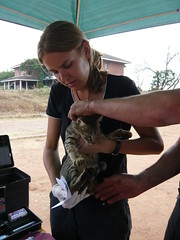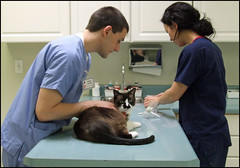 Also see part 1 cats
Also see part 1 cats
Do you know how to make a dog allergic to something?
First you vaccinate them a few times in a row and then you expose them to the allergen you want to make them allergic to and voila you have an allergic dog! Wow! And you wonder why so many dogs have allergies.
This has been known to researchers studying dogs for a long time but is not common knowledge among normal folk.
Most allergies in dogs develop in the three months following vaccination. In addition to allergies, over vaccination has been know to be linked to hypothyroid disease, autoimmune diseases such as autoimmune hemolytic anemia and lupus, cancer, kidney failure, and Addison’s disease.
See Are we vaccinating too much? and the book What Vets Don’t Tell You About Vaccines
So why do we routinely over vaccinate our canine friends? Why are they vaccinated every year to three years with vaccines that we know last much longer?
Good question! The first answer is that the vaccine companies have no incentives to test their vaccines out longer than three years. They want you to buy a vaccine often.
Fortunately researchers at universities are starting to do the needed research and the tides are changing but not fast enough in my opinion. Ronald Schultz from Univeristy of Wisconsin-Madison is currently the most active professor in research on vaccination of cats and dogs. The numbers I quote for the longevity of the core vaccines are from studies he has done and are based on serology testing. Although I have used the ideas and information from a recent lecture I was able to attend by him for this article, it is based on my views and interpretation of his work.
So how often should my dog be vaccinated you ask and what for?
Here is my protocol for dogs
- A combination vaccine containing canine distemper virus, parvovirus, and canine adenovirus (DHPP, DAP) at 6-9 weeks of age, 9-12 weeks of age and 14-16 weeks of age (at least two weeks between these three vaccines). Either a titer for these viruses should be performed two weeks after the last vaccine and if it is positive no more vaccination is needed for these three viruses ever again or your dog should be revaccinated at 1 year of age for these three viruses. This vaccine should give lifetime immunity with one dose at or after 16 weeks of age.
- Canine Rabies as needed by law. This may be especially important in dogs since they are more likely to bite someone. If your dog does bite someone and they are not vaccinated some states can require your dog to be euthanized and tested for Rabies! If you state will accept a titer instead of vaccination this is a better option than vaccinating every year or three years. If you give a rabies vaccine here is an excellent protocol for preventing vaccine reactions, Preventing vaccine adverse effects
And that is it! No really that is all you need – ever less than the kitties!
 But what about kennel cough and lyme disease and leptosporosis you ask? What about those Rottweilers and Dobermans, don’t you need to vaccinate them more often?
But what about kennel cough and lyme disease and leptosporosis you ask? What about those Rottweilers and Dobermans, don’t you need to vaccinate them more often?
Don’t worry, I’ll go through it all.
First the diseases you should vaccinate for
It is believed that one vaccine given to a dog at 16 weeks of age or older will give life long immunity with all these core vaccines.
- Canine Distemper
We know this vaccine lasts at least 9 years. Since distemper can be deadly this is an important vaccine. Distemper is related to the measles virus in people.
- Canine Parvovirus
One of the most contagious diseases known to dogs. It first was discovered in 1978 and spread around the world in a matter of months. Parvovirus is an almost identical virus to Feline Panleukopenia in cats. It destroys the immune system and intestinal tract and causes death in almost all untreated dogs and about 50% of those aggressively treated. This vaccine is one of the best and there is no reason not to vaccinate for this disease. We know this vaccine lasts at least ten years.
- Canine Adenovirus (Canine Hepatitis)
We currently don’t have Adenovirus in the United States because of this vaccine! This is a great example of why vaccination is important. However there is still Adenovirus in Mexico and South America so we should continue to vaccine for it. Even though Canine Adenovirus-1 causes canine hepatitis we use a vaccine for Canine Adenovirus-2 (a respiratory disease involved in kennel cough) to vaccinate against it. It works and it has fewer side effects than using a Canine Adenovirus-1 vaccine. We currently know that this vaccine lasts at least nine years.
- Rabies
Please see To vaccinate or not to vaccinate that is the question part 1 cats. The only difference for dogs is that Rabies is not known to induce fibrosarcomas.
And the diseases you shouldn’t vaccinate for
- Canine Coronavirus
This one is often added into the DHPP, making it DHPPC. There is a virus in dogs called coronavirus and many dogs get it. The main issue is that it doesn’t cause disease. They get it, it replicates a bit in their intestine and guess what they don’t get sick. Corona virus vaccine is often called the vaccine looking for a disease. Oh and by the way if coronavirus did cause disease you would need an oral vaccine to prevent it. Who made this one up?
- Giardia vaccine
The strains of giardia that cats and dogs get do not usually pass to people. Giardia is often subclinic in animals meaning that they don’t often get sick from it. This vaccine doesn’t prevent disease or infection but can decrease the amount of infectious cysts your dog sheds and can lower the risk that they pass it to other dogs. But really a vaccine that does not prevent infection or disease? Not recommended considering all vaccines have the risk of side effects.
Diseases you probably should not vaccinate for
Do your own research on these and talk to a veterinarian in your area.
 These are all bacterin vaccines which as vaccines against bacteria. Bacterins usually only induce protection for 6-9 months
These are all bacterin vaccines which as vaccines against bacteria. Bacterins usually only induce protection for 6-9 months
Bacterin vaccines should never be given at the same time as viral vaccines because they cause different immune responses which can increase the chance of side effects from the bacterin vaccines. This is especially important for leptosporosis which is often combinated into the DHPP (DHLPP). The exception is the kennel cough vaccine which if given intra-nasally can be given with viral vaccines.
What about those Dobermans and Rottweilers and the dogs who do not respond to vaccines?
1 in 1000 dogs will not respond to vaccines. This is a problem with there immune system. Rottweilers and Dobermans are more likely to have vaccine failure. Occasionally changing brands of vaccine will allow them to respond but not usually. You can vaccinate these dogs over and over again, you can vaccinate them every week and they will never respond, ever! If they are exposed to the disease they do not respond to most of the time they will die. Very sad but please don’t over vaccinate these guys it will only make things worse.
 When should vaccines not be given
When should vaccines not be given
- When an animal is under anesthesia – they can increase the risk of aspiration for your dog and can lead to vaccine failure because anaesthetic agents can be immunomodulatory ( they can change the immune response to the vaccine and cause vaccine failure).
- When your animal is pregnant
- When your animal is on immunosuppressive or cytotoxic drugs including chemotherapy agents and steriods. These drugs should be stopped for at least two weeks before vaccination
- When an animal has had an adverse reaction in the past to that vaccine. Do a titer if you can or skip the vaccine if it is not necessary.
- When your animal is sick. You don’t need to cause further immunosuppression in this animals. Vaccines for Canine Distemper and Canine Adenovirus will cause immunosuppression for about a week after vaccination.
Vaccines are often viewed as benign. They are not. Given correctly they are very good and powerful. Given too often they can be a disaster. Do your research before vaccinating!
 With all the talk of H1N1 in the news, I have started to get some questions on the canine influenza virus also known as N3H8 virus. And this year because a new vaccine for canine influenza came out, many of the questions are about if vaccination is important.
With all the talk of H1N1 in the news, I have started to get some questions on the canine influenza virus also known as N3H8 virus. And this year because a new vaccine for canine influenza came out, many of the questions are about if vaccination is important.










